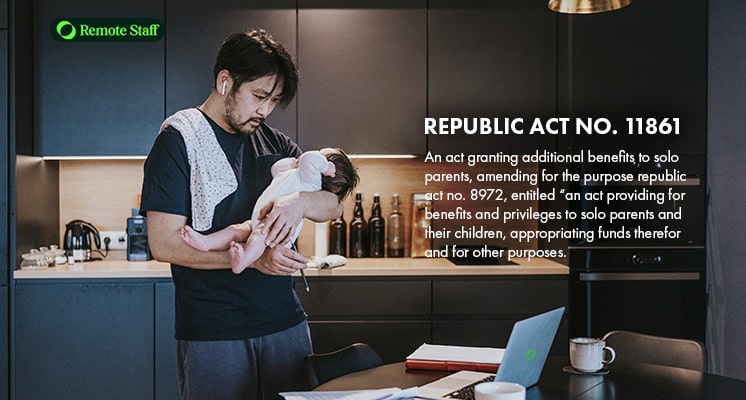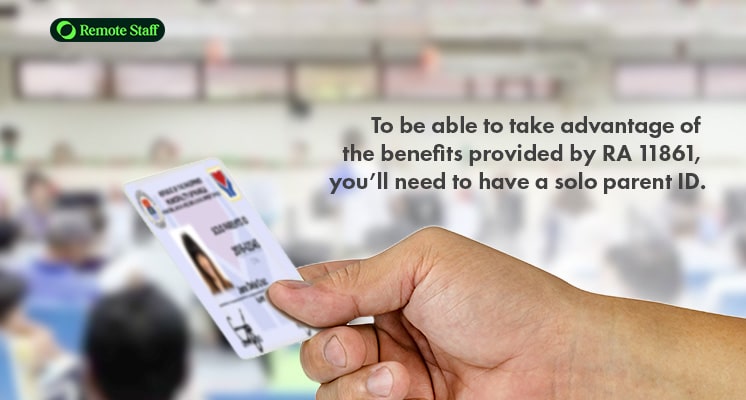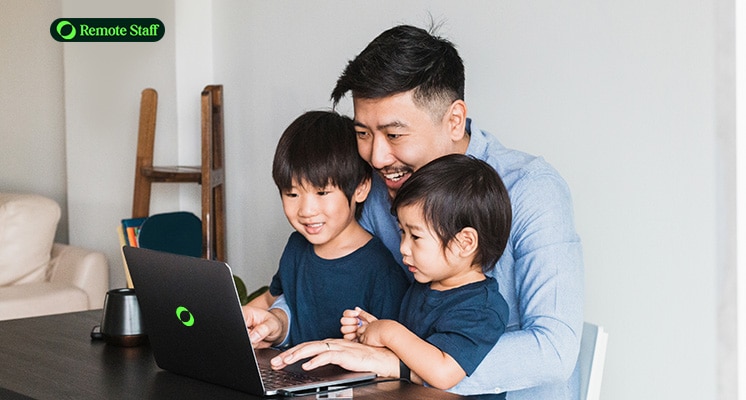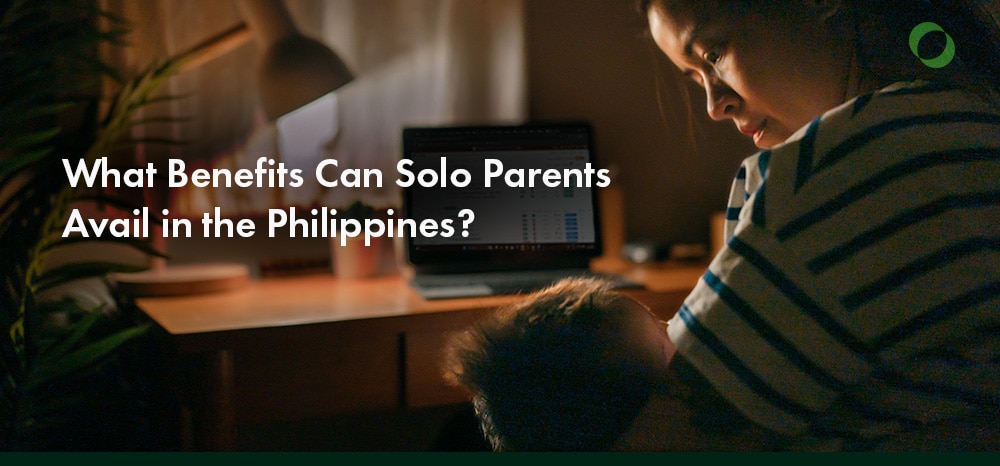Raising kids is no easy feat, especially for solo parents.
Besides working hard in their traditional or virtual workplaces to make ends meet, they must also find time to bond with their kids.
In recognition of their efforts and sacrifices, the Philippine government has enacted multiple policies to better support single mothers and fathers.
Chief among these is Republic Act (RA) 11861, also known as the Expanded Solo Parents Welfare Act.
This law provides several benefits to solo parents, like flexible work arrangements, discounts, livelihood programs, and more.
Want to know more about these benefits and how to avail them? Read on and find out.
The Expanded Welfare Act: RA 11861 and What it Changes
The Expanded Solo Parents Welfare Act (RA 11861) which lapsed into law on June 4, 2022, amends and strengthens RA 8972 – the original Solo Parents’ Welfare Act of 2000.
This law builds upon its predecessor by expanding the definition of solo parents, adding new benefits, and introducing a smoother application process.
All these aim to enhance the protection and support given to single moms and dads and their children.

Who is Considered a Solo Parent Under RA 11861?
RA 8972, RA 11861’s predecessor, only considered individuals raising children alone due to spousal death, abandonment, incapacity, separation, imprisonment, rape, single/unmarried status, or assuming caregiving roles in the family as solo parents.
RA 11861 broadens this scope to include the following individuals:
- Spouses or immediate families of OFWs (low/semi-skilled) who have been away for at least 12 continuous months.
- Grandparents, guardians, or relatives up to the 4th civil degree who single-handedly raise a child after the parents’ death, abandonment, disappearance, or absence, and
- Recognition for pregnant women providing sole care/support even before the child is born.
Key Benefits to Solo Parents
Let’s now take a look at the various benefits afforded to solo parents by RA 11861:
Solo Parent Leave
Single moms/dads are entitled to seven days of paid parental leave per year, non-cumulative and available after just six months of employment.
This is similar to paternity leave for married fathers or maternity benefits for mothers, which is granted specifically for the delivery of a child, giving parents time to bond with their newborn while receiving compensation.
In addition, they also have priority eligibility for flexible work arrangements under the Telecommuting Act (RA 11165).
PHP 1,000 Monthly Cash Subsidy
Solo parents earning a minimum wage or less benefit from a PHP 1,000 monthly cash subsidy, provided they’re not receiving another form of government cash assistance.
Discounts on Baby Essentials
Single parents earning less than PHP 250,000 a year enjoy a 10% discount and exemption from VAT on baby milk, food, micronutrient supplements, diapers, prescribed medicines, vaccines, and other medical supplements for children aged 0-6.
Housing, Livelihood, and Skills Training Programs
Solo parents, especially single moms, and their children are given priority in apprenticeship programs, livelihood training, OFW reintegration, employment info/matching, and other services offered by TESDA, DTI, DOLE, and DSWD.
In addition, they also receive priority services from government low-cost public housing projects under the NHA and LGUs, with more flexible payment terms.
Educational Assistance
Want to pursue higher education?
Educational scholarships are available to solo parents pursuing basic, higher, or technical education.
Another child support benefit they’ll receive is a full scholarship for one child, with entitlement covering basic to tertiary or vocational training via DepEd, CHED, and TESDA.
PhilHealth Automatic Coverage
Single moms/dads and their children receive automatic enrollment in PhilHealth, with premiums paid by the national government and shared (for formal workers) with their employers.
Social Protection Services
DSWD, alongside LGUs and partner agencies, is also mandated to provide solo parents with targeted interventions for individuals in need of protection, regardless of income, which include:
- Temporary shelter,
- Counseling,
- Legal Aid,
- Parent training,
- Medical aid, and
- Stress debriefing.

How to Apply for a Solo Parent ID
To be able to take advantage of the benefits provided by RA 11861, you’ll need to have a solo parent ID.
Here’s how you can get one:
Required Documents
First, you’ll need the following documents:
- Barangay Certificate proving at least six months of residency,
- Proof of solo parent status, like:
- PSA birth certificate/s of your child/children,
- PSA death certificate of spouse (if widowed),
- Certificate of detention/imprisonment,
- Medical certificate for spouse’s incapacity, and
- Court degree or affidavit for legal separation, annulment, abandonment, or rape-related pregnancy,
- Proof of Income (i.e., Income Tax Returns (ITRs), barangay/municipal certification, or Certificate of Indigency),
- An affidavit or barangay certification affirming parental responsibility, and
- A completed application form, provided by the City/Municipal Social Welfare Development Office (C/MSWDO) or DSWD.
Where to Apply
Once you have all the required documents above, you can submit your application at the following locations:
- Your LGU’s City/Municipal Social Welfare Development Office.
- In cities like Quezon City and Caloocan, you can apply for or renew the ID online via the local e-services portal.
- In some municipalities, the DSWD itself handles applications. In this case, submit your documents to your local DSWD office.
Application Process and Renewal
Upon submitting your application, your local C/MSWDO logs your application and assigns a case number to it.
A social worker will then review your documents and may conduct an interview or a home visit.
If they approve your application, your ID will then be prepared (printed/signed by the mayor or authorized official) within approximately 30 days from filing. Some municipalities can even process your application in as fast as 7 days.
Once your ID is ready, you can either pick it up or have it delivered.
Typically, your solo parent ID is valid for only a year, but some LGUs offer a three-year validity with annual validation.

How Can Employers Support Solo Parents?
The local government and their own families aren’t the only people who can help solo parents.
Here’s how employers can also support their single-parent employees:
Enforce Non-Discrimination
The first, and most important, thing you can do to help your single-parent employees is provide an inclusive and welcoming workplace.
This means not discriminating against single parents in terms hiring, workloads, promotions, or dismissal due to their family status.
Furthermore, you should also inform them about RA 11861’s provisions so they know the benefits they’re entitled to.
Provide a Flexible Work Environment
Another way you can make your workplace more inclusive is by providing more schedule flexibility to solo parents.
Doing so helps them better balance their workloads with attending school events, doctor’s appointments, or any other emergencies.
Ensure Their Parental Leave Requests Are Honored
RA 11861 mandates that solo parents can avail of seven days of paid, forfeitable parental leave annually after just six months of employment.
Aside from granting this, employers must also:
- Record and track usage, and
- Refrain from penalizing leave requests.
Promote Education and Training Opportunities
One other way to promote inclusivity and boost productivity at the same time is by providing in-house training or referrals to external programs (i.e., TESDA or scholarship opportunities).
Helping them upskill improves their performance and even allows them to take on new or higher roles in your company.
FAQ: Solo Parent Rights and Benefits in the Philippines
Here are some of the most common questions single parents ask regarding their rights and benefits in the Philippines:
Can a Father be Considered a Solo Parent?
Yes.
RA 11861 defines the term “solo parent” as any individual, regardless of gender, who provides sole parental care and support to a child due to specific conditions like:
- Death, abandonment, or incapacitation of the other parent,
- Detention or imprisonment of the other parent,
- Legal separation, annulment, or divorce,
- Being an unmarried father who decided to raise the child alone, and
- Being a guardian/relative assuming sole responsibility of a child.
Thus, you’ll receive the same benefits as single moms, like minimum wage benefits, paid parental leave, and more.
Do I Still Qualify if I’m Separated From My Spouse but Not Legally Annulled?
Yes.
RA 11861 reduces the qualifying period for separation from one year to six months while also recognizing both legal and de facto separation.
This means that if you’ve been living separately from your spouse for at least six months (even without legal paperwork) and have sole custody and provide primary care, you’re eligible for solo parent status.
Can I Use the (Solo Parent) ID Even if I’m Employed?
Absolutely.
Many of the solo parent ID’s perks, like the parental leave and flexible work arrangements, PhilHealth enrollment, and discounts and subsidies, are only available to employed parents.
Always have your ID on hand when applying for leaves or requesting flexible schedules, as HR needs it for proof of eligibility.
What Happens if My Financial Status Changes?
In the event your financial situation changes (e.g., earning more than the income thresholds set by RA 11861), it can affect your eligibility for certain benefits like:
- PHP 1,000 Monthly Cash Subsidy:
- This benefit is only for solo parents earning minimum wage or less.
- 10% Discount + VAT Exemption on Baby Essentials:
- Available only if your annual income < PHP 250,000.
However, there are also universal benefits available to solo parents, regardless of income, like:
- PhilHealth Coverage,
- Parental Leave,
- Telecommuting priority, and
- Housing, educational scholarships, access to training programs, etc.

You Don’t Have to Do Things Solo Anymore
Being a solo parent doesn’t mean facing life’s challenges alone.
Laws like RA 11861 provide multiple benefits that you can avail of to make your family’s lives that much easier.
Unfortunately, not many single parents know about these benefits, so sharing what you’ve learned with your friends and loved ones greatly helps.
However, what a solo parent needs most is a stable and flexible job to help pay the bills.
If you’re looking to shift to a remote work setup, Remote Staff is here to help.
Our jobs list contains plenty of positions to choose from, ranging from virtual assistant and online transcription jobs to online design and writing jobs.
Ready to start working for remote-first companies? Click here. Good luck!

